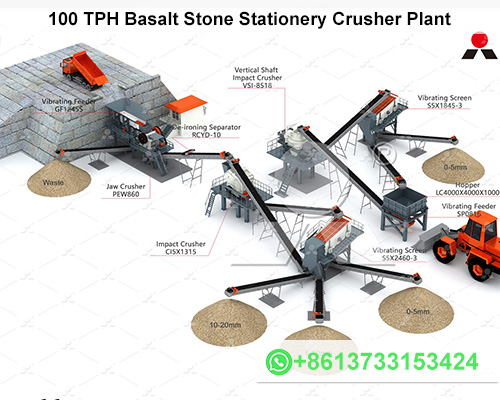100 TPH Basalt Stone Stationery Crusher Plant in Somalia
- High Demand for Aggregates
Somalia’s infrastructure revival, including roads, ports, and housing, requires durable basalt aggregates. A stationary plant ensures consistent supply for large-scale projects. - Adaptability to Harsh Conditions
Stationary crusher is designed for long-term operations, ideal for Somalia’s rugged terrain and extreme weather. - Cost Efficiency
Producing aggregates on-site reduces transportation costs and delays, critical in remote regions. - Job Creation
Local employment opportunities in plant operation and maintenance support community development. - Primary Jaw Crusher
- Crushes raw basalt (≤600 mm) into 150–200 mm chunks.
- Recommended: PE-600×900 Jaw Crusher (75 kW motor).
- Secondary Cone Crusher
- Further reduces material to 20–50 mm for versatile applications.
- Example: PYB1200 Cone Crusher (110 kW motor).
- Vibrating Screens
- Classifies aggregates into sizes (e.g., 0–5 mm, 5–20 mm, 20–40 mm).
- 3-deck screens optimize output for concrete, asphalt, or drainage layers.
- Conveyor Belts and Feeders
- Ensures smooth material flow between crusher and screens.
- Dust Control System
- Mitigates airborne particles, complying with environmental standards.
- Road Construction
- Basalt aggregates provide strength for asphalt and road base layers.
- Concrete Production
- Crushed basalt enhances durability in residential and commercial buildings.
- Port and Airport Development
- Used in runways, docks, and erosion-resistant structures.
- Water Drainage Systems
- Sized aggregates improve filtration and flood prevention.
- Equipment Costs
- Primary Crusher: 25,000–25,000–25,000–40,000
- Secondary Crusher: 30,000–30,000–30,000–50,000
- Screens and Conveyors: 20,000–20,000–20,000–35,000
- Total Setup: 150,000–150,000–150,000–250,000 (depending on automation and brand).
- Operational Costs
- Power Consumption: ~150 kWh, requiring reliable electricity or diesel generators.
- Labor: 5–8 skilled workers for 24/7 shifts.
- Tips to Reduce Expenses
- Source equipment from trusted Chinese manufacturers for budget-friendly options.
- Partner with local logistics companies to cut import taxes and shipping costs.
- Opt for modular designs for easier maintenance and part replacements.
- Power Supply Issues
- Solution: Install diesel generators or hybrid power systems.
- Dust and Heat Management
- Solution: Use water spray systems and heat-resistant lubricants.
- Skilled Labor Shortage
- Solution: Collaborate with vocational training institutes for operator programs.
- 30% cost savings compared to imported materials.
- Created 12 local jobs in maintenance and logistics.
Introduction
A 100 TPH (tons per hour) basalt stone stationary crusher plant is a critical investment for infrastructure development in Somalia. With the country’s growing demand for road construction, building materials, and industrial projects, this setup offers a reliable solution to process hard basalt rock into high-quality aggregates.

This guide covers the benefits, key components, applications, and cost considerations of installing a stationary crusher plant in Somalia to meet local and regional construction needs.
Why Choose a 100 TPH Basalt Crusher Plant in Somalia?
Key Components of a 100 TPH Stationary Crusher Plant
Applications of Basalt Aggregates in Somalia
Cost Breakdown and Investment Tips
Challenges and Solutions in Somalia
Case Study: Successful Crusher Plant in Mogadishu
A 100 TPH stationary plant installed in 2022 now produces 2,400 tons of basalt daily, supplying aggregates for the Mogadishu-Afgoye Highway. Key outcomes:
Conclusion
A 100 TPH basalt stone stationary crusher plant is a strategic asset for Somalia’s infrastructure growth. By selecting robust equipment, optimizing operational workflows, and addressing local challenges, businesses can achieve long-term profitability while contributing to national development.

